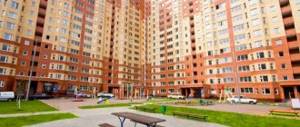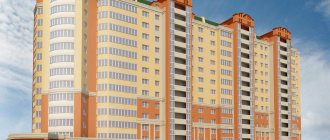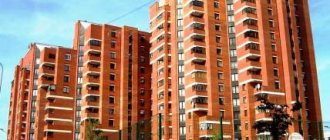Composition of project documentation
Law No. 176-FZ establishes a new requirement that supplements the list of sections of design documentation for the construction and reconstruction of apartment buildings.
So, according to the new paragraph. 11.2 hours 12 tbsp. 48 of the Civil Code of the Russian Federation, the design documentation should include information on the standard frequency of work on major repairs of apartment buildings necessary to ensure the safe operation of such a house, on the volume and composition of the specified work. By virtue of Part 14 of Art. 12 of Law No. 176-FZ, this requirement does not apply if, before the day this law comes into force (06/30/2015):
- the design documentation for the construction and reconstruction of apartment buildings has been approved or sent for examination of the design documentation (in other words, it does not need to be supplemented);
- design documentation for the construction or reconstruction of an apartment building is not subject to examination and an application for a permit to build such a house has been submitted (if the documentation is not subject to examination, but the application for a construction permit has not yet been submitted, a new section should be developed).
The amendments under consideration are aimed at ensuring that regional capital repair programs that justify the obligation of property owners to pay contributions for capital repairs are reliable.
The difference between direct control and other forms
The distinctive feature of this form is expressed in its very concept - the owners are authorized to resolve all the problems of a multi-story building directly, bypassing various representatives and intermediaries. The common areas of the residents are under the direct control of the owners.
The following property is considered to be common property:
- Common areas (stairwells, elevators, vestibules and corridors, storage rooms, waste disposal structures).
- Foundation (including the ground underneath) and basements.
- Ceilings, door and window openings.
- Attics and roofs.
- House area (children's or sports grounds, parking lots, recreation areas for residents).
Any problem regarding the maintenance of the above-mentioned territories is resolved through a meeting of the owners. Each owner of the living space in the house has the right to propose his own version of the permit, which will be submitted for consideration. Having agreed on a way to fix the problem, the owners also select one or more residents who are authorized to carry out the order. A contractor (for example, an organization) may also be selected to perform the work. Then the owners will act as customers. An agreement is concluded with the contractor.
When solving utility problems for a separate home, the owner of the premises personally enters into an agreement with the contractor or supplier.
Options for resolving current problems can only be selected collectively, taking into account the wishes of all apartment owners. Meetings must be held at least once a year. There are options for both in-person (meeting) and absentee (poll) voting.
New building management
Previously, the developer was allowed to decide immediately after putting an apartment building into operation - to enter into a management agreement with a specialized (from 05/01/2015 - licensed) organization or to manage the house independently (provided the developer complies with the standards and rules for managing apartment buildings) before concluding management agreements with the management company ( Management Company), selected based on the results of an open competition held by a local government body (LGU).
Starting from June 30, 2015, Part 14 of Art. 161 of the Housing Code of the Russian Federation is set out in a new edition: until the conclusion of a management agreement for the apartment building between the person specified in clause 6, part 2 of art. 153 of the Housing Code of the Russian Federation, and the management organization selected based on the results of an open competition, the management of the house is carried out by the management organization, with which the developer must conclude a management agreement for the apartment building no later than five days from the date of receipt of permission to put the house into operation. It seems that this amendment is intended to help protect the rights of owners of premises in the house, since within the framework of the management agreement for apartment buildings, the duties and responsibilities of the management company are spelled out in great detail in the law, which cannot be said about the legal status of the developer. At the same time, the question naturally arises: what are the consequences for a developer who violates these requirements and does not conclude a management agreement on time? First of all, according to the author, the developer cannot be held administratively liable for managing an apartment building without a license (Part 1 of Article 14.1.3 of the Code of Administrative Offenses of the Russian Federation) for the reason that the activity of managing an apartment building is subject to licensing on the basis of a management agreement (Part. 2, Article 192 of the Housing Code of the Russian Federation), and the developer, by law, cannot act as a executor under such an agreement. It is possible that shareholders who received premises under the deed may demand protection of their rights by forcing the developer (through the state housing supervision authorities or the court) to enter into an agreement with the management company.
Additionally, we note that the condition on the developer’s obligation to enter into a management agreement with the management company cannot deprive him of the right to collect payment for residential premises and utilities from users of the premises. By the way, from Art. 155 of the Housing Code of the Russian Federation was not deleted and Part 7.3 continues to be in force, which literally reads like this: when a developer manages an apartment building without concluding a management agreement for such a house with a management organization, the payment for residential premises and utilities is paid by the person specified in paragraph 6 of Part. 2 tbsp. 153 of this Code, to the developer.
Service Features
Self-administration includes not only caring for the house itself, but also landscaping the surrounding area, the availability of playgrounds for children, and a sufficient number of benches and trash cans.
At the meeting, an authorized person is elected who will coordinate the implementation of this work, conclude the necessary contracts, keep records of all documentation, and prepare reports on the work done. As a rule, the commissioner and the chairman of the council are one person.
According to the law, the choice of method must be made within one year. If it was not possible to reach a consensus, then this will be done by the local government body.
Latest edits
The changes introduced to the legislation are designed to make direct management easier.
The changes are as follows:
| Indicators | Description |
| Simplification of participation in the general meeting of residents | it became possible not to attend the meeting in person, but to issue a power of attorney for the right to vote on his behalf. This power of attorney does not have to be certified by a notary, spending money on it. It can be certified by a competent person at the place of work or study |
| The number of votes required to make decisions has changed | Previously, at least 2/3 of the votes of those present at the meeting were required to make a positive decision. Now it is enough for half of the residents to vote for the decision |
| It is now possible to open a bank deposit and place funds collected for major repairs on it | interest from the deposit will provide protection against cash inflation |
Organization of work
Joint solution of inevitable problems will lead to the unity of the team of residents of the house. Each of them can make their own proposals, which will differ depending on the needs and lifestyle of each.
A person returning from work on the second shift needs good lighting, and retirees need sufficient benches. No mother would refuse a well-equipped playground, but dog owners have their own problems.
You can organize days for joint cleaning of the local area, taking your children with you. Everyone, feeling like a master, can contribute. For example, it will not be difficult for a person who is familiar with carpentry and has the necessary tools to nail a rickety plank.
If it is necessary to carry out more complex work, you should resort to the services of third-party organizations. It is the responsibility of the chairman to do this.
The order of work organization is as follows:
| Indicators | Description |
| A group of activists is being created | it is desirable that it includes representatives from each entrance |
| A census of all apartments is being compiled | entering this house |
| Walking around the apartments | in order to familiarize its residents with the new rules |
| Notify everyone about the upcoming meeting during a personal visit | advertisements at the bottom of the entrance or placed in mailboxes |
| To hold a meeting | the decision must be made only by voting. The final calculation takes into account the proportion - the vote of one resident is equal to the number of square meters that are in his use |
The meeting of residents must resolve the following issues:
- Approve the management form.
- Select responsible persons.
- Draw up the necessary contracts.
The meeting ends with the drawing up of a protocol in which all those present sign. Each owner has the right to independently choose the companies with which contracts will be concluded. It is acceptable for a responsible representative to do this for all tenants.
Financing nuances
The absence of intermediaries implies that residents will be responsible for distributing funds on their own. The decision is made at the meeting and recorded in the minutes. It is possible to choose a representative who will represent the interests of the majority.
With direct management, there is no government funding for major home repairs. In this regard, it is not advisable to use this method for dilapidated housing.
Video: pros and cons
Obligation of the developer to pay a fee
The Housing Code establishes the obligation of the owner of the premises to pay fees for the maintenance and repair of common property, management of apartment buildings and utilities.
As is known, a person becomes the owner of a premises from the moment of registration of ownership rights. Therefore, in order to fairly distribute the burden of maintaining premises in newly built houses, in 2011, in Part 2 of Art. 153 of the Housing Code of the Russian Federation, clause 6 was introduced, according to which the obligation to pay for residential premises and utilities arises from the person who accepted from the developer (the person providing the construction of the apartment building) after issuing him permission to put the house into operation of the premises in this house under the transfer act or other document on the transfer, from the moment of such transfer. Until this moment, the burden of maintaining the premises must be borne by the developer (the person providing the construction of the apartment building). However, managers and resource supplying organizations often had to prove this rule in court, relying only on the general norm of Art. 210 of the Civil Code of the Russian Federation that the owner bears the burden of maintaining the property he owns. Starting from 06/30/2015 in Part 2 of Art. 153 of the Housing Code of the Russian Federation there is a new clause 7, which establishes the obligation of the developer (the person providing the construction of the apartment building) in relation to the premises in a given house that have not been transferred to other persons under a transfer deed or other transfer document, to pay a fee from the moment he is issued permission to enter the house into operation.
Modern management of an apartment building: problems, prospects, innovations
- direct management of premises owners in an apartment building;
- management of a homeowners' association (HOA) or a housing cooperative or other specialized consumer cooperative;
- management of the management organization.
- leaders who came from Soviet leadership structures (party, Komsomol)
; - managers whose main goal is to quickly make a profit.
- homeowners associations (HOAs);
- housing maintenance departments (HOE);
- housing management companies (ZhEUK);
- housing maintenance offices (ZhEK);
- Directorate for Building Operations (DEZ);
- housing and communal services (HCS);
- utility service companies;
- cottage villages;
- garage-building cooperatives;
- dacha cooperatives;
- unified settlement centers;
- management companies.
Today housing and communal services
is a technically complex economy that requires new developments and new technologies so that service structures “not only load residents with volumes of services, but also reduce the cost of these services.”
Let's try to identify problems in managing an apartment building
.
In the conditions of improvement of the national economy (reform of housing and communal services),
the most important criterion for assessing the work of housing and communal services is customer focus. Customer focus is a characteristic of the business itself. It reflects the place of the client’s interests in the system of priorities of management and owners. Agree, it is difficult to call a customer-oriented company that strives to squeeze money out of the client for every little thing.
And how can management of apartment buildings and housing and communal services in general move towards customer orientation?
If we want to work professionally and efficiently, then the management
of
an apartment building must be “smart”. It is necessary to break the stereotype of the “Soviet Department” in management. That is, in our management there are now 2 types of managers of apartment buildings:
Accordingly, for client-oriented, high-quality management of an apartment building, not a single type of management is suitable for us. We need leaders of the “new generation” who will have a sufficient level of knowledge, education and the desire to put them into practice in the field of management, considering human relations to be the main thing in their work. And this does not mean at all that it is necessary to change a leader of type 1 or 2 to a leader of the “new generation” - this means that improving the management of an apartment building should be in the “minds” of managers, which will lead to further professional transformation of management in the industry.
It is no secret that customer service is one of the weakest points in the activities of housing and communal services enterprises. Many have experienced the increase in housing and communal services tariffs and the reason for our indignation is not that they have actually increased, but that with the increase in tariffs we do not see an improvement in the quality of service to consumers. After all, if you compensate for the increase in tariffs by at least improving service and focusing on the consumer, then consumer loyalty will increase. In turn, the formation of public opinion will include an understanding: increased tariffs - improved quality of service. The quality of services can be improved through transparency of accounting and prompt response to consumer requests, and for this it is necessary to introduce modern software in the industry, keep up with the times, through automation of business processes, and the creation of a unified information system (UIS)
.
In the context of complex commercial activities of housing and communal services enterprises and organizations, accounting, control of business processes and integration of data into the Unified Information System at enterprises in the housing and communal services industry has acquired particular importance. You can automate the management of an apartment building by implementing the 1C:VDGB system: Accounting in housing and communal services management companies, HOAs and housing cooperatives, which is intended for use in HOAs, housing cooperatives, DEZs, housing and communal services, managers and other similar housing and communal services organizations that conduct the calculation of rent and others utilities, and passport registration.
For managing an apartment building
system
1C:VDGB: Accounting in housing and communal services management companies, homeowners' associations and housing cooperatives 8
is an effective tool for making management decisions with the help of specialized and universal reports that ensure transparency of the accounting process and reduce labor intensity by automating basic operations.
Software solution 1C:VDGB: Accounting in housing and communal services management companies, HOAs and housing cooperatives 8
developed on the 1C: Enterprise 8 technology platform and is suitable for any institutions in the field of utilities and housing services, such as:
The program is suitable for both a small HOA and a large management company or settlement center. Functionality of the 1C:VDGB system: Accounting in housing and communal services management companies, homeowners' associations and housing cooperatives 8
provide solutions to the following tasks:
- registration of property owners;
- full accounting of residential and non-residential stock;
- work with personal accounts;
- calculations and accruals;
- interaction with service providers;
- drawing up cost estimates, closing cost accounts in accordance with the estimate and monitoring its implementation;
- accounting of votes and voting results;
- generation of various reports (financial and personal account; certificate in the State Center for Housing Property; balance sheet, etc.)
; - accounting and tax accounting is carried out through integration with the 1C: Accounting 8
; standard accounting and tax accounting is possible without the need to exchange and upload between the rent accounting and accounting modules; - house-to-house cost accounting;
- emergency dispatch service.
Summarizing the above, we note that the management tool 1C: VDGB: Accounting in management companies of housing and communal services, homeowners' associations and housing cooperatives 8
is an integral condition for ensuring transparency of business processes in the management of an apartment building, which in turn increases the efficiency of management companies.
High-quality management through the UIS gives us:
- reduction in tariff growth;
- the ability to quickly respond to citizens’ requests;
- additional funds for the improvement of local areas and public places;
- transparency of business processes (for example, transparency of savings for major repairs)
, etc.
Thus, through modern software and the customer focus of the housing and communal services industry, service consumers receive high-quality service.
Management agreement with the winner of an open competition
In accordance with Part 13 of Art.
161 of the Housing Code of the Russian Federation, the local self-government body is entrusted with the obligation to hold an open competition in a timely manner to select a management company to manage the house after issuing permission to put it into operation. It also provides for the obligation of persons who accepted premises from the developer under the deed to enter into a management agreement with the winner of the competition. Previously, from the provisions of the Housing Code of the Russian Federation it followed that such an agreement was concluded without fail in accordance with Art. 445 of the Civil Code of the Russian Federation. This article describes a special procedure for the exchange of offers and acceptances, protocols of disagreements, the final stage is judicial proceedings, following which the contract is considered concluded from the moment the court decision comes into force. Obviously, it is not at all profitable for the management company to go to court with claims addressed to each owner (legal owner) of the premises. In addition, it is considered that in this case actual contractual relations have developed between the parties, that is, the owners of the premises are not exempt from paying fees to the management company. Now the legislator has significantly simplified the procedure by removing mention of Art. 445 of the Civil Code of the Russian Federation and adding to Part 13 of Art. 161 of the Housing Code of the Russian Federation the following wording: if within two months from the date of the open competition the owners have not concluded a management agreement with the management organization, such an agreement is considered concluded on the terms determined by the open competition. It is interesting that the new norm refers to the owners, and not to the persons who accepted the premises from the developer under the deed.
The essence of direct management of MKD
Under the direct management of apartment buildings, apartment owners enter into agreements for the maintenance and repair of the house based on decisions of the general meeting of residents. This method of management allows them to enter into legal relations with resource supply companies (RSCs) - organizations that provide the supply of gas, water and electricity.
Direct form of management of an apartment building is a way that allows premises owners to negotiate with contractors on maintaining the optimal condition of the house.
If we are talking about the legal side of the issue, each tenant of the premises, on his own behalf, enters into an agreement for the supply of resources.
The organization that maintains and carries out repairs in the house, provides water drainage, heating, electricity and gas supply, is responsible to the owners of the premises in the apartment building for the performance of its functions. These provisions are established by the Government of the Russian Federation, expressed in and contained in concluded agreements.
The procedure for switching to NU
In order to switch to NU, the initiators of the changes must convene a general meeting. Notice of the location and date of the meeting, as well as a list of items up for vote, must be sent to each homeowner.
The next stage is holding training camps. This can be done in person or in absentia. It is also important to ensure that a representative of the local administration is present, as this is required by law.
The last step is to select a service company and prepare an agreement. At this stage, you also need to start drawing up direct contracts with the RNO.
Note! After each owner of the living space signs separate agreements with RSO for the supply of resources to his apartment, he will be responsible solely for his own debt. However, payment for additional services, such as cleaning or caring for flower beds, will be made from the funds actually transferred. That is, a situation is possible when contributions from conscientious residents will cover the debts of malicious defaulters.
Rules for documenting NU
The choice of management method is a free act of will. This means that residents can at any time consolidate any of the allowed administration mechanisms or change the manager appointed in the past. Since a certain number of citizens live in the apartment building, the decision is made by a collegial body - the general assemblies.
The procedure for holding a meeting of co-owners is provided for in Art. 45 LCD. Any of the homeowners can convene the OS, but it will be eligible only if at least 50% of the total number of subjects with the right to vote participate.
Before the meeting of owners, the initiator of the OS develops an agenda - a list of issues that will be considered at the meeting. If the organizer puts to a vote a proposal to consolidate a new form of management, then the agenda separately indicates items on the transition to direct management, the selection of a responsible representative and the conclusion of service contracts.
Download: sample contract for direct management of an apartment building
Download: sample minutes of a meeting of owners in an apartment building
Important! Based on the results of the meetings, minutes of the meeting are drawn up. The document displays all important information - the place and date of the meeting, the number of people present, issues discussed, voting results.




